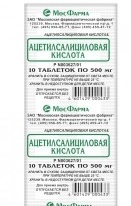Tablets Advil is a non-steroidal anti-inflammatory drug
Contents:
- Pharmacokinetics and pharmacodynamics
- Scope and contraindications
- Adverse reactions and overdoses
- Dosage
- Precautions and special instructions
- reviews about the drug Advil
 No man who never in his life did not suffer from any kinds of pain orHigh temperature. To eliminate them, you can take non-steroidal anti-inflammatory drugs, for example, such as Advil. It is about the instructions for the use of Advil tablets, reviews, prices, and their analogues will be discussed in this article.
No man who never in his life did not suffer from any kinds of pain orHigh temperature. To eliminate them, you can take non-steroidal anti-inflammatory drugs, for example, such as Advil. It is about the instructions for the use of Advil tablets, reviews, prices, and their analogues will be discussed in this article.
Pharmacokinetics and pharmacodynamics
Advil tablets have antipyretic, analgesic and anti-inflammatory effect. The active substance of the drug is ibuprofen. It nonselectively blocks cyclooxygenase 1 and 2, reduces the production of prostaglandins, the main mediators of inflammation. The analgesic effect is due to the arrest of the inflammatory process and a decrease in the synthesis of bradykinin, the main substance responsible for pain sensitivity.
Antipyretic action is explained by a decrease in the excitability of the center of thermoregulation located in the medulla oblongata. When taken orally, the medicine is well absorbed from the digestive tract.
When taken on an empty stomach the greatest concentration in the systemic circulation is observed after about an hour. If you drink the drug after a meal, then this time increases to 1.5-2.5 hours.
In the joint cavity the active substance migrates slowly, but it is deposited in the synovia, it has a higher concentration in comparison with the blood. Ibuprofen undergoes metabolic reactions in the liver. It is excreted mainly by the kidneys.
 What do you think is better: Aspirin or Ibuprofen? When is it better to take Aspirin.
What do you think is better: Aspirin or Ibuprofen? When is it better to take Aspirin.
Can Aspirin relieve a headache, read here.
Scope and contraindications
According Usage instructions Advil tablets administered under conditions such as:
- inflammatory and degenerative diseases of the musculoskeletal system, including various forms of arthritis, osteochondrosis, Bechterew's disease, myalgia, bursitis, sciatica, and others;
- for pain and fever of various genesis, for example, in headaches, dental, menstrual, joint and muscle pains, for normalizing the temperature for colds or after vaccination.
According to the instructions for use Advil is contraindicated in such conditions and diseases as:
- hypersensitivity;
- bleeding of various origins;
- erosive and ulcerative diseases of the digestive system in the stage of exacerbation, as well as gastrointestinal illnesses are provoked by the intake of drugs of the NSAID group in the anamnesis;
- severe liver and kidney pathology;
- Decompensated heart failure;
- "aspirin" bronchial asthma or various allergic reactions in history caused by the use of acetylsalicylic acid or other non-steroidal anti-inflammatory drugs;
- blood diseases, including thrombocytopenia, hemophilia, and leukopenia;
- last trimester of pregnancy;
- hearing loss;
- problems with vision such as "lazy eye", a disorder of color perception, scotoma, pathology of the optic nerve.
You should also be careful when treating patients of the older age group. With caution, the drug should be prescribed if observed:
- lactation period;
- I and II trimester of pregnancy;
- high pressure;
- heart failure;
- nicotine and alcohol dependence;
- a history of digestive disease, such as an ulcer, gastritis, colitis;
- while taking other drugs from NSAID group, anticoagulants, antiplatelet agents, corticosteroids, selective serotonin reuptake inhibitors.
Undesirable reactions and cases of overdose
To reduce the likelihood of adverse reactions taking medication, short-term courses should be taken in a minimally effective dosage. Most often, unwanted reactions are observed in the older age group, especially on the part of the digestive system. Overdose sometimes causes death. As a rule, the probability of side effects increases with increasing dose.
 On the background of therapy, the following undesirable phenomena may appear:
On the background of therapy, the following undesirable phenomena may appear:
- digestive organs: gastric bleeding, dyspepsia disorder, tarry stool, regional enteritis, colitis, ulcerative stomatitis, vomiting of blood, hepatitis, increased activity of hepatic enzymes;
- of the blood: agranulocytosis, decrease in the concentration of blood elements;
- CNS: headaches, serous meningitis;
- of the genitourinary system: renal failure, the appearance in the urine of blood and protein, oliguria;
- respiratory system: dyspnea, bronchial asthma and bronchospasm;
- cardiovascular system: heart failure, hypertension, swelling of the extremities.
Important! Taking the drug may trigger allergic reactions. When an overdose of the drug may cause nausea, vomiting, loose stools, drowsiness, dizziness, development of hypotension and coma.
There is no specific antidote. Gastric lavage is recommended. If after taking large doses of the medication has passed no more than an hour, shows the reception of adsorbents. In other cases, alkaline mineral water and forced diuresis are prescribed, which help to quickly remove the active substance from the body.
Dosage regimen
Patients over 12 years are allowed to take 1 tablet( 200 mg) up to 4 times a day. To achieve a more rapid therapeutic effect, it is allowed to take 2 tablets at a time. The greatest daily dose is 1200 mg. If the patient's condition has not improved after 3 days after the start of the medication, you should visit the doctor without delay.
Precautions and special instructions
- In people suffering from bronchial asthma or allergies, a drug can provoke bronchospasm.
- Women planning to conceive need to remember that ibuprofen suppresses ovulation.
- When taking the drug, it is worth to be cautious when driving a car, as against the background of treatment there may be dizziness and drowsiness.
- Patients with connective tissue diseases should be taken with caution, since they are more likely to develop aseptic meningitis.
Before starting treatment, it is necessary to inform the doctor about the medications being taken, since ibuprofen with many drugs is incompatible.
 Did you know that taking acetylsalicylic acid causes Reye's syndrome?
Did you know that taking acetylsalicylic acid causes Reye's syndrome?
What side effects occur after taking the tablets Next, find out here.
What to choose: Paracetamol or Aspirin, read this article http: //golmozg.ru/farmacevtika/ aspirin-ili-paracetamol.html. In what cases is Aspirin contraindicated.
Reviews about the drug Advil
Reviews about tablets Advil are mostly positive. Most patients report a faster onset of therapeutic effect. It alleviates pain of various origins.
Negative reviews about the drug are due to the fact that it can only be bought in America. In Russian pharmacies are sold complete analogs of medicines: Nurofen, Mig, Ibuprofen. Despite the over-the-counter release of preparations based on ibuprofen, a specialist consultation is required before they are taken. We offer a video about the active substance of the Advil tablets.
write the question in the form below:



